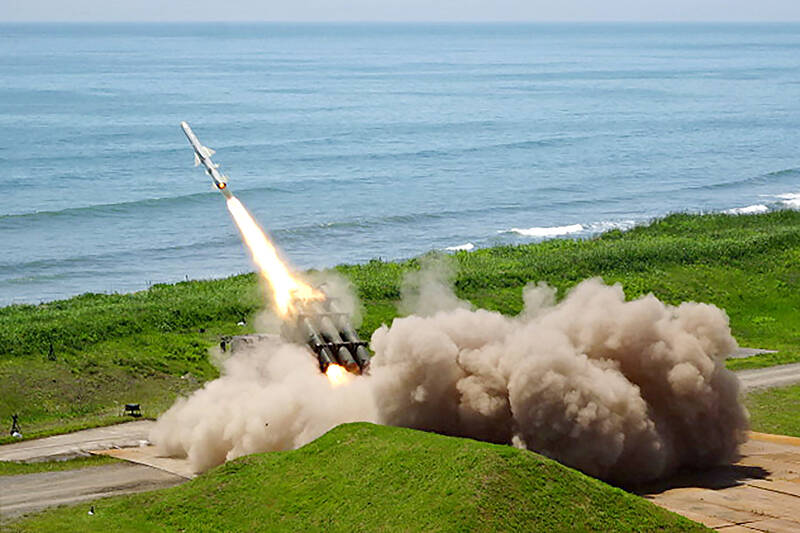Japan’s military on Tuesday test-fired a missile on Japanese territory for the first time, as the country accelerates its military buildup to deter China.
The Type 88 surface-to-ship, short-range missile was tested at the Shizunai Anti-Air Firing Range on Japan’s northernmost main island of Hokkaido.
The Japan Ground Self-Defense Force’s 1st Artillery Brigade used a training missile to target a boat with no crew about 40km off the island’s southern coast.

Photo: AFP / Japan Ground Self-Defense Force
Due to space limitations and safety concerns, Japan conducted past missile tests in the US, a treaty ally, and Australia, a top Japanese defense partner, where vast training grounds are available.
The military said that the test was successful.
It plans another through Sunday.
Dozens of protesters stood outside a neighboring army camp, saying missile tests only escalate tensions in Asia and risks involving Japan in possible conflicts.
Tuesday’s first domestic missile test underscores Japan’s push toward a more self-sufficient military and its acquisition of strike-back capabilities as a deterrence to China’s increasingly assertive naval activity in regional seas.
Japan is also concerned about growing joint military exercises around Japanese coasts between China and Russia.
Japan and Russia, a northern neighbor to Hokkaido, have territorial disputes.
Japan, under its post-World War II pacifist constitution, used to limit the use of force for self-defense only, but made a major break from that policy in 2022 when it adopted a five-year security strategy that names China as its biggest strategic challenge and calls for a closer Japan-US alliance.
Japan is working to deploy long-range cruise missiles, including Tomahawks purchased from the US, beginning later this year.

DAREDEVIL: Honnold said it had always been a dream of his to climb Taipei 101, while a Netflix producer said the skyscraper was ‘a real icon of this country’ US climber Alex Honnold yesterday took on Taiwan’s tallest building, becoming the first person to scale Taipei 101 without a rope, harness or safety net. Hundreds of spectators gathered at the base of the 101-story skyscraper to watch Honnold, 40, embark on his daredevil feat, which was also broadcast live on Netflix. Dressed in a red T-shirt and yellow custom-made climbing shoes, Honnold swiftly moved up the southeast face of the glass and steel building. At one point, he stepped onto a platform midway up to wave down at fans and onlookers who were taking photos. People watching from inside

A Vietnamese migrant worker yesterday won NT$12 million (US$379,627) on a Lunar New Year scratch card in Kaohsiung as part of Taiwan Lottery Co’s (台灣彩券) “NT$12 Million Grand Fortune” (1200萬大吉利) game. The man was the first top-prize winner of the new game launched on Jan. 6 to mark the Lunar New Year. Three Vietnamese migrant workers visited a Taiwan Lottery shop on Xinyue Street in Kaohsiung’s Gangshan District (崗山), a store representative said. The player bought multiple tickets and, after winning nothing, held the final lottery ticket in one hand and rubbed the store’s statue of the Maitreya Buddha’s belly with the other,

‘NATO-PLUS’: ‘Our strategic partners in the Indo-Pacific are facing increasing aggression by the Chinese Communist Party,’ US Representative Rob Wittman said The US House of Representatives on Monday released its version of the Consolidated Appropriations Act, which includes US$1.15 billion to support security cooperation with Taiwan. The omnibus act, covering US$1.2 trillion of spending, allocates US$1 billion for the Taiwan Security Cooperation Initiative, as well as US$150 million for the replacement of defense articles and reimbursement of defense services provided to Taiwan. The fund allocations were based on the US National Defense Authorization Act for fiscal 2026 that was passed by the US Congress last month and authorized up to US$1 billion to the US Defense Security Cooperation Agency in support of the

HIGH-TECH DEAL: Chipmakers that expand in the US would be able to import up to 2.5 times their new capacity with no extra tariffs during an approved construction period Taiwan aims to build a “democratic” high-tech supply chain with the US and form a strategic artificial intelligence (AI) partnership under the new tariffs deal it sealed with Washington last week, Taipei’s top negotiator in the talks said yesterday. US President Donald Trump has pushed Taiwan, a major producer of semiconductors which runs a large trade surplus with the US, to invest more in the US, specifically in chips that power AI. Under the terms of the long-negotiated deal, chipmakers such as Taiwan Semiconductor Manufacturing Co (TSMC, 台積電) that expand US production would incur a lower tariff on semiconductors or related manufacturing